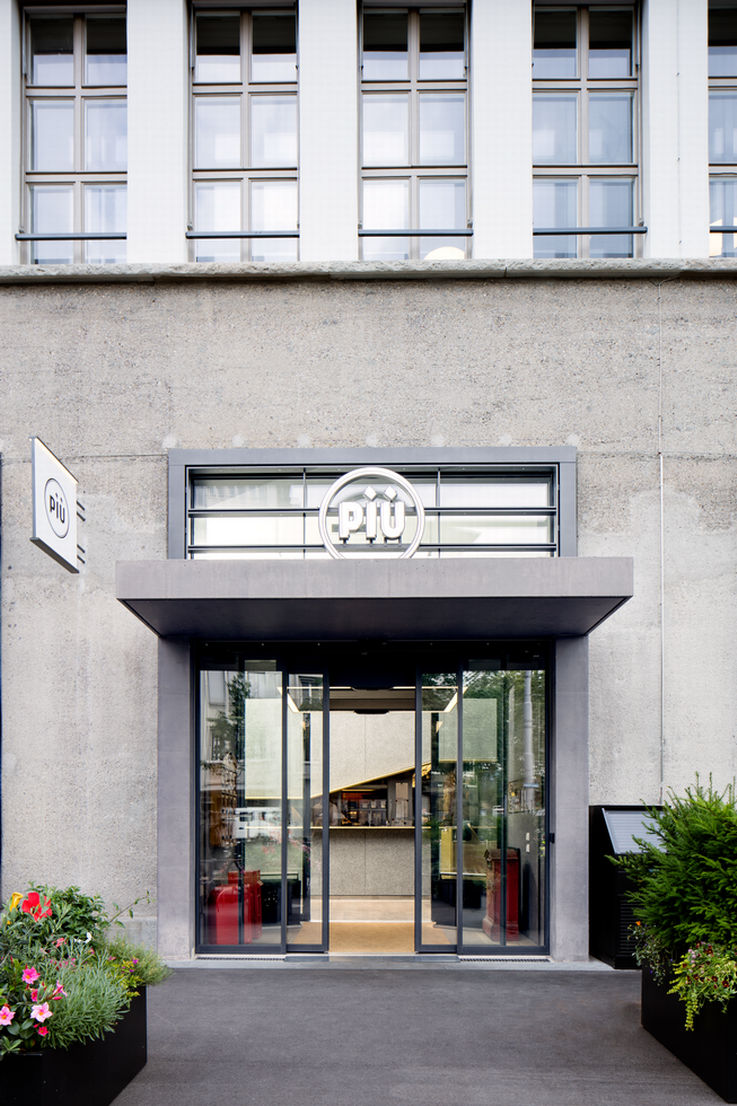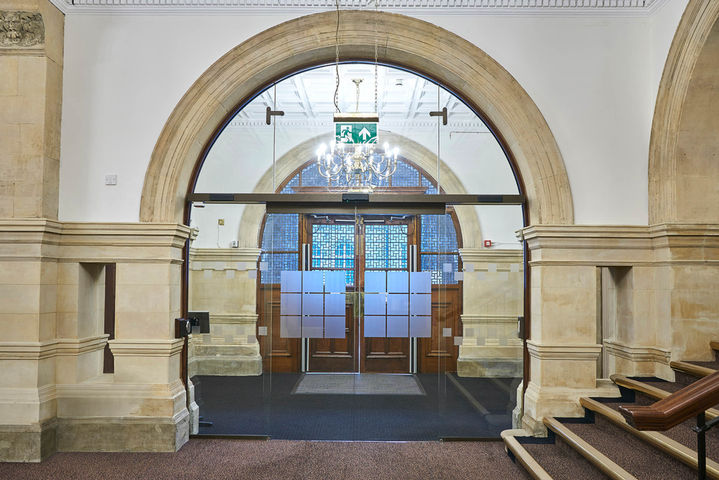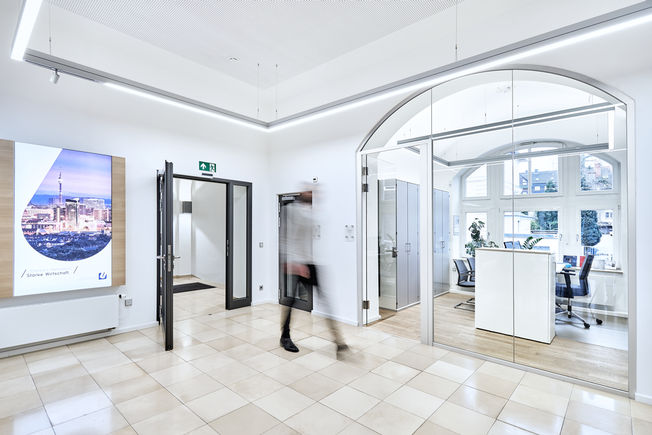Sustainable building stock: Renovation, not demolition
Is your building getting a bit outdated? Perhaps it has an old heating system, leaky windows, or virtually no insulation? If that sounds familiar, you might want to consider a renovation. You could insulate it with contemporary heating, for example, or include modern building technology and floor plans. You need good renovation plans and decent funding to improve the energy efficiency and design of a building.
Maintenance and modernisation

GEZE door technology for the entrances to the renovated Sihlpost in Zürich. © Lorenz Frey / GEZE GmbH
There are many buildings in Germany that are not equipped with state-of-the-art technology. The result: high levels of energy consumption, high heating costs, reduced quality of life – and harm to the climate and the environment. The majority of buildings in Germany were constructed prior to the first Thermal Insulation Ordinance in 1978, leaving many of them now in need of renovation, certainly when it comes to the building’s energy consumption.
Building renovation is defined as the structural and technical restoration, or modernisation of one or several floors or even an entire existing structure. On the one hand, it can focus on maintenance, but also on resolving flaws (partial renovation). Often, antiquated equipment and building technology is replaced and supplemented by a contemporary and modern design (full renovation).
Playing a major role in renovations are: windows and doors
As part of a renovation, the outer shell of a building, walls, roof, and floors are often fitted with thermal insulation. In addition, windows and doors, the heating system, the electrics, and sanitary facilities are usually renovated, removed or replaced.
Energy-efficient renovation pays off
Energy-focused renovation is an important component in achieving the climate targets of the German Federal Government and the EU. More than 18 million residential buildings and around 1.7 non-residential buildings in Germany (e.g. office buildings, company buildings, hospitals, schools, universities, sports centres, theatres, and churches) should be pretty much ’climate-neutral’ by 2050, meaning they will produce virtually no CO2. Energy-related renovations of non-residential buildings often pay for themselves fairly quickly, as they usually need far more energy than residential buildings. Professional renovation and modern building technology can sometimes reduce energy consumption by up to 80 per cent.
Furthermore, the German government provides funding for residential and non-residential building renovations via the KfW banking group. Development funds in the form of loans and subsidies are available for full renovations or also for individual measures such as insulation, replacing windows, air-conditioning units, and building automation.
KfW funding for building renovation
Via the Kreditanstalt für Wiederaufbau (KfW), the German Federal Government supports building renovations for private individuals, companies, and local authorities in the form of loans or investment grants. The basic criteria for obtaining funding is that the renovation leads to the KfW Efficiency House standard. The KfW Efficiency House is a technical standard that the KfW applies to its financing products. Various figures indicate how high the property’s annual primary energy requirement is compared to a similar new building. Note: The lower the figure, the greater the energy efficiency and the higher the subsidy.
- KfW energy efficiency programme - energy-efficient building and renovation (reduce energy costs in commercial buildings)
- Energy-efficient renovation (for renovation to a KfW efficient house or individual energy-related measures)
- Age-appropriate renovation (measures for reducing barriers and safeguards against burglary)
- In addition, there are also KfW subsidies for smart home systems as part of age-appropriate renovations, or as an additional measure when carrying out energy-related renovation work.
- Energy-efficient building and renovation (for energy-related renovation of existing buildings within communal and social infrastructure, no residential buildings).
- Barrier-free town (for barrier-reducing measures, via which existing communal and public buildings, traffic facilities, and public spaces can be renovated in an age-appropriate and family-friendly manner.)
Advice is also subsidised
A KfW subsidy is often subject to an energy efficiency expert being involved . This means, for example, that private individuals and local authorities can receive KfW assistance (subsidy for construction support) if an energy efficiency expert provides planning and construction support.
Go to the various funding opportunities offered by KfW
Renovation for improved safety, fire protection, and accessibility
The primary aim of renovations is of course to implement energy-saving measures – and because of the many forms of subsidies available. However, a change of use may also be a reason for renovation. This often leaves the owners with other issues to make decisions about. For example, if the building no longer satisfies modern safety and fire protection standards when being converted into a children’s day nursery. Or if modern usage calls for a different floor plan. Renovations may also be carried out to create barrier-free access and make a building suitable for disabled people to live and work in.
KfW funding allows owners to also redesign their building at the same time as making it more energy efficient. This means that an old building can be renovated to become a smart building.
GEZE provides support during renovation work
GEZE supports both new-build projects and work on existing buildings by developing and delivering new concepts for energy-saving ventilation technology as well as for fire protection and access for all. Various GEZE products can effectively help with energy saving, including indoor climate control via automated windows, door closers, and through intelligent building networks. GEZE door solutions provide barrier-free ease of access, safe escape routes, and energy efficiency.
Renovation of existing buildings
GEZE solutions aren’t just used in new buildings. With little additional effort, they can also be installed in old or existing buildings - and help save energy and money.

Logo for German Sustainable Building Council membership
GEZE is a member of the German Sustainable Building Council (DGNB)
GEZE products and solutions support sustainable construction (green building). Green building means the modern, sustainable, environmentally friendly, and resource-saving construction and renovation of buildings in harmony with people and with nature.
GEZE is an active member of the German Sustainable Building Council (DGNB). The aim of this non-profit organisation is to encourage sustainable building and operation of the built environment.
The DGNB newsletter provides regular updates from the world of sustainable construction.
Specific suggestions for building automation and façade renovation
Planning is paramount when carrying out renovations. Ideas and concrete suggestions for building automation and intelligent technical solutions for the façade should be developed as early in the process as possible:
- automatic night-time back cooling
- various opening widths for windows and doors, e.g. with summer/winter setting
- thermally separated, heat-insulated window profiles
Easy installation
Many GEZE products are used in renovations as they can often be installed easily. Automatic swing door systems are, for example, characterised by a simple assembly process and they can also be retrofitted.
It’s a simple and flexible way to stay ahead of the frequently updated DIN standards and technological regulations that have to be adhered to during renovations.
Retro-fitting and updating made easy
Generally speaking, the expected lifetime and useful life of building technology has always been shorter than that of the building itself. Technical systems need to be replaced from time to time. And building technology requirements, building safety in particular, also change as a result of modifications in legislation, for example DIN 18650.
The service experts at GEZE have many years of experience and fully understand all of the demands made of building systems. This is backed by ongoing training on changing regulations and directives. We offer you new future-proof product solutions, starting with the automation of your doors, and through to the equipment or modernisation of your building with escape and rescue route solutions. And of course, we offer you the chance to update or change your drives from other manufacturers.









